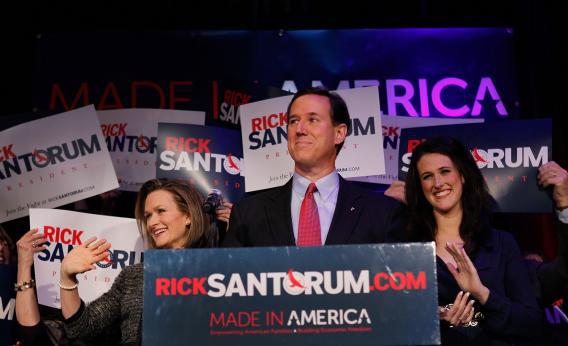Rick Santorum has been making a few different versions of the argument that the spike in gasoline prices in 2008 was the cause of the financial crisis and subsequent recession. Some forms of this argument, like the idea that high gas prices caused the housing bubble to burst are indefensible for simple reasons of timing. But in some ways this bolsters Santorum’s larger point. The fall in house prices and residential investment began well before the recession, and as Brad Plumer argues there’s a fair amount of evidence that the high gas prices did contribute meaningfully to the economic slowdown.
What I would say against Santorum is that there’s the recession that the NBER Business Cycle Dating Committee says started way back in December 2007 and then there’s the Great Recession that played out in the fall of 2008 and the subsequent winter and has dominated the political agenda ever since. The recession that provided the backdrop for 90% of the 2008 presidential campaign is pretty easy to explain. Homebuilding activity fell off a cliff, and the workers were being imperfectly transitioned into export-oriented and import-competing industries. Joblessness was on the rise, and people were hurting. Oil prices very plausibly played a role in making the transition out of construction and into other things more difficult. But the Great Recession that’s troubling people simply isn’t a matter of laid-off construction workers being unable to find factory jobs. It’s laid-off construction workers being joined by laid-off factory workers and laid-off retailers and laid-off middle managers followed by laid-off teachers and cops. It’s a fundamental failure of macroeconomic policy—a large-scale simultaneous decline in basically every sector of the economy—that’s not explicable in terms of external shocks.
Incidentally, back in 1997 Ben Bernanke co-authored an interesting paper (PDF) on how the deleterious impact of oil shocks can be amplified by a poor monetary response. Expensive oil hurts the economy directly in some ways, but if the monetary authorities respond by tightening monetary policy that hurts the economy even more. The European Central Bank doesn’t seem to have read that paper, and twice during the past few years has decided that the right answer to high commodity prices is to raise interest rates and throw people out of work. Bernanke, not surprisingly, has avoided making a flagrant version of this error but I think he did make a small-scale version of it. The Fed started cutting interest rates in late-2007 and pretty steadily kept on cutting until they went to zero. But there was a “pause” period from about May to September of 2008 as if the Fed suddenly stopped caring about the weakness in the economy. That period coincides with a big spike in the headline CPI even though core CPI was simultaneously indicating a lessening of inflationary pressures. With core CPI decelerating and unemployment rising, the Fed should have been cutting rates. But instead the spiking oil prices seem to have paralyzed them on core monetary policy, even while the Fed was simultaneously scrambling to cope with a banking crisis. The in October they went back to cutting rates, but also took the contractionary measure of paying interest on excess bank reserves.
Now I think it would be giving Santorum way too much credit to argue that he “really meant” that oil badly exacerbated the recession by inspiring the Fed to keep money unduly tight during the summer of 2008, but I think you can make the case that this happened.
